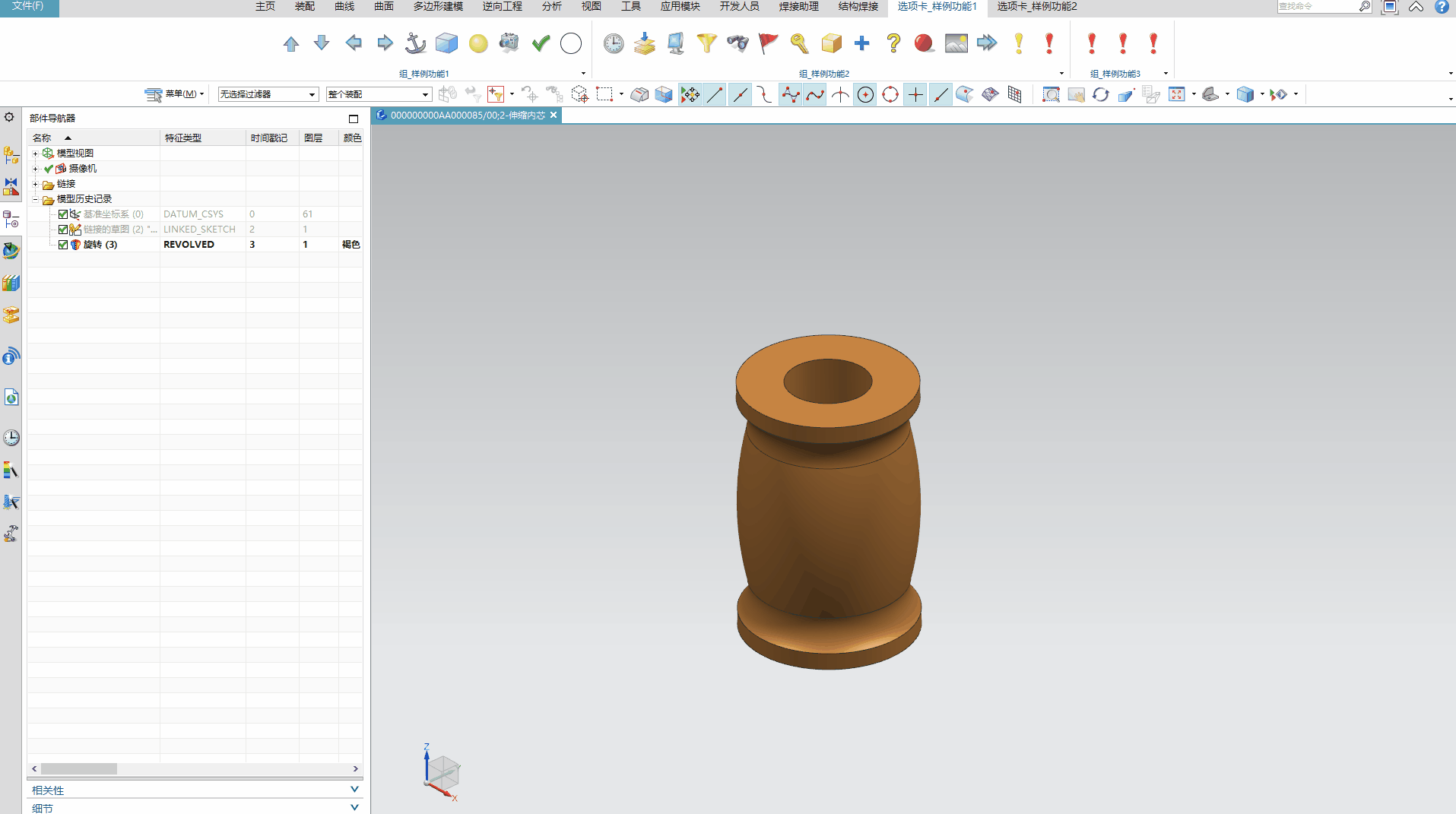NX二次开发:一个DLL设置多个按钮操作的方法
还有很多人不知道如何设置一个DLL调用不同的功能,今天说的是通过入口函数参数值进行设置。还有一种方法是使用UF_MB.h里面的函数也可以实现,今天先说一种,具体看代码。
1 //============================= 2 // 一个DLL设置多个按钮操作的方法 3 //============================= 4 // Mandatory UF Includes 5 include <uf.h> 6 include <uf_object_types.h> 7 include <uf_draw.h> 8 include <uf_part.h> 9 include <uf_ugmgr.h> 10 include <uf_ui.h> 11 include <uf_obj.h> 12 include <uf_drf.h> 13 14 // Std C++ Includes 15 include <iostream> 16 include <sstream> 17 include <vector> 18 include <string> 19 include <algorithm> 20 include <tchar.h> 21 include <atlconv.h> 22 include <shellapi.h> 23 24 include <windows.h> 25 undef CreateDialog 26 pragma comment(lib,"shell32.lib") 27 28 using namespace NXOpen; 29 using std::string; 30 using std::exception; 31 using std::stringstream; 32 using std::endl; 33 using std::cout; 34 using std::cerr; 35 36 static enum StringValue { 37 evNotDefined, 38 evStringValue1, 39 evStringValue2, 40 evStringValue3, 41 evStringEnd 42 }; 43 static std::map<std::string, StringValue> s_mapStringValues; 44 static void Initialize() 45 { 46 s_mapStringValues["HNMDL_TOOL251"] = evStringValue1; 47 s_mapStringValues["HNMDL_TOOL252"] = evStringValue2; 48 s_mapStringValues["HNMDL_TOOL253"] = evStringValue3; 49 s_mapStringValues["end"] = evStringEnd; 50 51 cout << "s_mapStringValues contains " << s_mapStringValues.size() << " entries." << endl; 52 } 53 54 55 extern "C" DllExport void ufusr( char *parm, int *returnCode, int rlen ) 56 { 57 try 58 { 59 UF_CALL(UF_initialize()); 60 61 Initialize(); 62 63 switch (s_mapStringValues[parm]) 64 { 65 case evStringValue1: 66 uc1601(parm, 1); 67 // 其他操作 68 break; 69 case evStringValue2: 70 uc1601(parm, 1); 71 // 其他操作 72 break; 73 case evStringValue3: 74 uc1601(parm, 1); 75 // 其他操作 76 break; 77 default: 78 uc1601(parm, 1); 79 // 其他操作 80 break; 81 } 82 83 UF_CALL(UF_terminate()); 84 } 85 catch (const NXException& e1) 86 { 87 UI::GetUI()->NXMessageBox()->Show("NXException", NXOpen::NXMessageBox::DialogTypeError, e1.Message()); 88 } 89 catch (const exception& e2) 90 { 91 UI::GetUI()->NXMessageBox()->Show("Exception", NXOpen::NXMessageBox::DialogTypeError, e2.what()); 92 } 93 catch (...) 94 { 95 UI::GetUI()->NXMessageBox()->Show("Exception", NXOpen::NXMessageBox::DialogTypeError, "Unknown Exception."); 96 } 97 } 98 99 extern "C" DllExport int ufusr_ask_unload() 100 { 101 return (int)NXOpen::Session::LibraryUnloadOptionImmediately;// 调试用 102 //return (int)NXOpen::Session::LibraryUnloadOptionAtTermination;// 程序发布用 103 //return (int)NXOpen::Session::LibraryUnloadOptionExplicitly; 104 }
相关简介及函数截图:


GIF动图:

黄河远上白云间,一片孤城万仞山。
羌笛何须怨杨柳,春风不度玉门关。
诗人初到凉州,面对黄河、边城的辽阔景象,又耳听着《折杨柳》曲,有感而发,写成了这首表现戍守边疆的士兵思念家乡情怀的诗作。
诗的前两句描绘了西北边地广漠壮阔的风光。首句抓住自下(游)向上(游)、由近及远眺望黄河的特殊感受,描绘出“黄河远上白云间”的动人画面:汹涌澎湃波浪滔滔的黄河竟像一条丝带迤逦飞上云端。写得真是神思飞跃,气象开阔。诗人的另一名句“黄河入海流”,其观察角度与此正好相反,是自上而下的目送;而李白的“黄河之水天上来”,虽也写观望上游,但视线运动却又由远及近,与此句不同。“黄河入海流”和“黄河之水天上来”,同是着意渲染黄河一泻千里的气派,表现的是动态美。而“黄河远上白云间”,方向与河的流向相反,意在突出其源远流长的闲远仪态,表现的是一种静态美。同时展示了边地广漠壮阔的风光,不愧为千古奇句。
